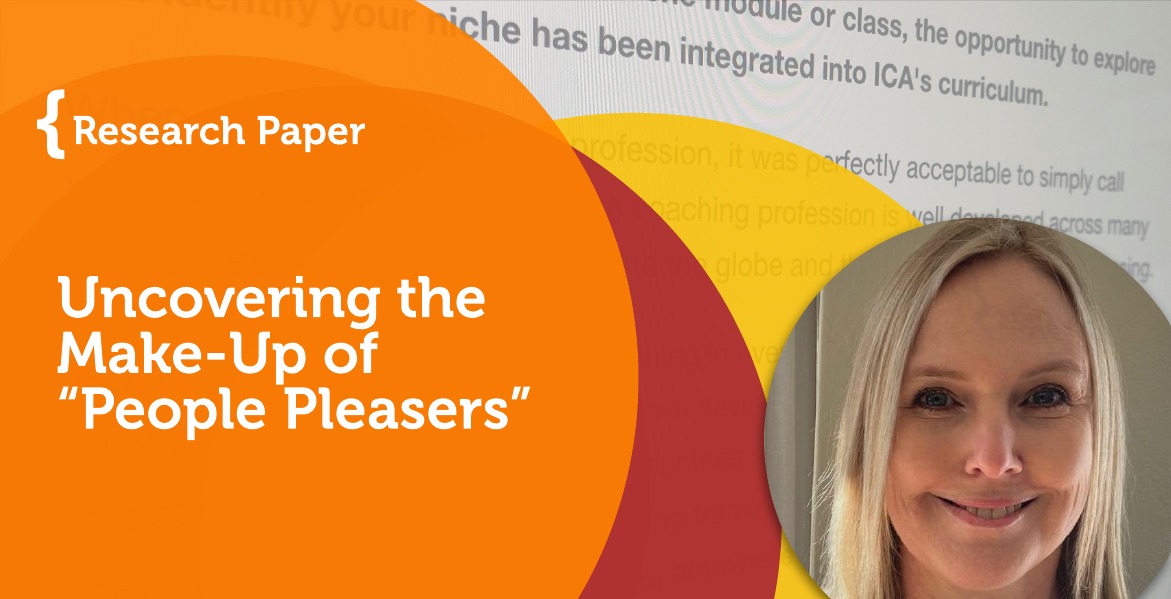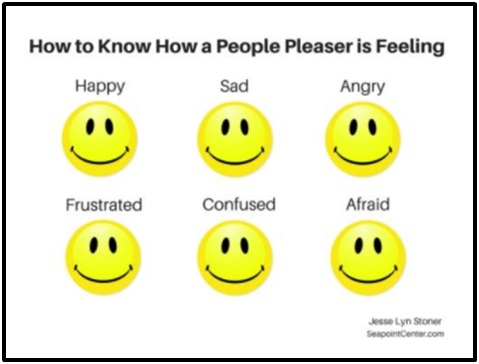 Research Paper By Tracy Van Biljon
Research Paper By Tracy Van Biljon
(Life and Empowerment Coach, SOUTH AFRICA)


Care about what other people think and you will always be their prisoner. Lao Tzu
When you say yes to others, make sure you aren’t saying no to yourself. Paulo Coehlo
Introduction
So what is a people pleaser? A people pleaser is someone who tries hard to make others happy. They will often go out of their way to please someone, even if it means taking their own valuable time or resources away from them. People pleasers often act the way they do because of their insecurities and lack of self-esteem.
Personally, I think that most people engage in some form of “people-pleasing” depending on their situation or environment. Then you get those individuals who have made “people-pleasing” a fine art. When I think of a people pleaser, my sister instantly comes to mind. If I had to describe her, I would say that she is a genuinely good person who always, without fail, puts everyone else’s needs above her own, from her children to her husband, to her extended family, her friends, and even her work colleagues. She is this naturally maternal person always looking out for everyone’s needs. Although I am sure that this is fulfilling for her in a lot of ways, as someone looking in from the outside, I clearly see the other side of this equation. If this way of life truly made her happy, then I would say, so be it. But I can see the negative impact that this has on her. It is draining. She has never really considered her needs, what it is that she wants, what is important to her, what would make her happy. She has essentially buried her essence.
Although I have not begun this research as yet, my intuition tells me that being a people pleaser affects many other behavioral characteristics; allowing yourself to be bullied, avoiding confrontation, not processing your feelings, and probably many more. So the question is, how do we as coaches partner and support these clients, especially when they do not recognize this trait about themselves? The key to this question is first to really understand “People Pleasers”
Let’s Unpack
Starting with the Why
As much as Life Coaching does not explore the client’s past, it is helpful that a coach has an “academic” understanding of the origins of the behavioral patterns or traits of People Pleasers. Being a People Pleaser is also sometimes referred to as being “co-dependent” meaning that your relationship to self is defined by other people. Your identity, self-worth, and self-esteem are all dependent on others, so essentially it is a loss of self, as your world revolves around taking care of the needs of others.
We “people-please” for many reasons. I don’t necessarily think that there is one single underlying reason for these tendencies. The majority of Psychotherapists, Psychologists, agree that these tendencies may develop from a combination of factors including, but not limited to the following:
According to Sharon Martin, Psychotherapist, and Co-Dependency Expert, our need to please is actually more of a need to belong. And our need to belong is one of the very basic needs of humanity. Although it might sometimes be easier to live a solitary life, it is not very fulfilling. Most people want to experience that sense of belonging, we want to form lasting bonds with others. Who doesn’t find it painful to be rejected or criticized by others? Who doesn’t fear being alone? And what does being alone mean? That we are inadequate, not worthy of being loved? So we go to extreme lengths to please others to avoid these very feelings.
Characteristics/Behaviours of People Pleasers
What are the signs that you are a People Pleaser? Several characteristics are common to most People Pleasers and will show up in varying degrees:
-
You tend to agree with everyone
This happens when you actually disagree with other people’s opinions, but then pretend to agree because you want to be liked. This can lead to serious internal conflict particularly when this does not align with your values
-
You feel responsible for how other people feel
You might relate this to empathy, but it is not the same thing. You cannot make everybody happy. Each individual is responsible and in charge of their own happiness.
-
You apologize often
Frequent apologies can be seen as a sign of blaming yourself or thinking that other people are blaming you. You don’t have to apologize for being you.
-
You often feel burdened by the things that you have to do
This actually goes hand in hand with not being able to say no. You just have so much to do because your schedule is filled with doing everything that other people need you to do or so you think. Not being able to say no just compounds this.
-
You feel uncomfortable when someone is angry at you
This is really a horrible feeling – when you cannot stand the thought of someone being cross or at odds with you. It can take over your thoughts completely until the action that you take compromises your values.
-
You act like the people around you
It is completely normal for different people/social circles to bring out different elements of your personality, but studies show that People Pleasers engage in self-destructive behavior if they think that it will make other people feel better/more comfortable.
-
You need praise to feel good
While most people feel good when praised, they do not depend on it for their sense of self-worth. People Pleasers on the other hand depend on praise from others for the validation that it provides.
-
You go to great lengths to avoid conflict
While I think that most people do not enjoy conflict or confrontation, People Pleasers will avoid conflict at all costs. This ultimately means that they will struggle to stand up for what they believe in.
-
You don’t admit when your feelings are hurt
To keep the status quo in relationships and not upset the balance, you will not speak up when your feelings have been hurt and will instead internalize this. This will seriously impact the quality and authenticity of the relationships that you have.
-
You’re a Giver
What is wrong with being a giver you might ask? It all depends on your motivation or the intention behind the giving. If you are giving intending to be like, this can lead to a downward spiral when people do not reciprocate with the affection that you desire
There is another side to this equation in that People Pleasers, due to the very nature of being “good at what they do”, have built up a set of skills:
The Move from “People Pleaser” to “Self Pleaser”/Co-dependent to Independent.
I personally do not feel that there is a quick fix to rid anyone of their people-pleasing tendencies. This has usually been built up over a lifetime and will require some really hard work and commitment to change. Like a lot of things, the first step is recognizing and accepting that this is you, a People Pleaser. If you want to break the pattern of people-pleasing, recognizing how these behaviors show up in your life is a good first step. Increasing awareness around the ways you tend to people-please can help you start making changes.
Finding the Middle Ground
As you work towards being “independent” and overcoming the problematic people-pleasing tendencies, it is important to find a balance between meeting other people’s needs and meeting your own needs. You can do this by:
Coaching Application
In terms of coaching, this issue might present itself in two ways. Firstly, a client has realized on their own that they are a People Pleaser and as a result are seeking coaching to deal specifically with this aspect. On the other hand, this might come up with an existing client who has enlisted your support for a completely different topic. This then might become a little bit more complicated depending on whether the “People Pleasing” or Co-dependency is having a direct impact on the client’s main goal.
Reflective Questions that will assist with this Process:
Conclusion
Having now researched this topic, I have found that there are coaches that specialize in supporting “People Pleasers” or have a niche that deals specifically with moving from being “Co-dependent to Independent” which is really another way of interpreting the same behavioral characteristics. Recognizing potential People Pleasers is an important requirement for me as an Empowerment and Life Coach (The Pathfinder) as these tendencies will be a direct obstacle to fulfilling my goal to empower my clients. This often comes to the fore when clients are not able to answer questions about what their needs are, what they want from life, what would make them happy, as they are always thinking about what everyone else needs and wants. This does not automatically place them into the “People Pleasers” box, but understanding the associated behaviors will assist with asking the right questions to move your client forward.
References
From Co-Dependent to Independent (Mary Joye, LMHC)
The Need to Please: The Psychology of People Pleasing (Sharon Martin, LCSW)
https://www.healthline.com/health/people-pleaser (Erica Meyers/Crystal Maypole)